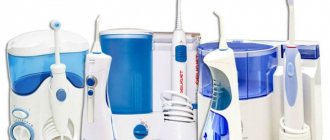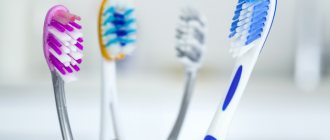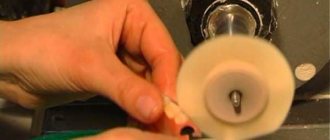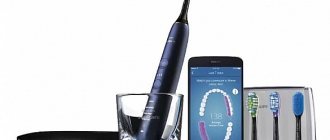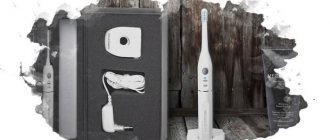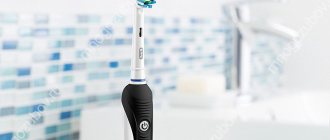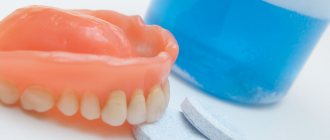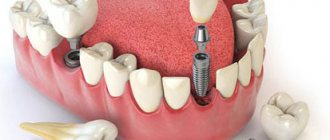Technological progress does not stand still. Humanity is receiving an increasing number of devices for comfort and health. Teeth and oral cavity are one of the most important areas of disease prevention. It is easier to prevent illness than to treat it later. Experts recommend the use of irrigators that require special liquids.
What is an irrigator
An irrigator is a device for cleansing the oral cavity of contaminants, i.e., soft plaque and microscopic food debris. An ordinary toothbrush cannot always cope with the task and, as a result, the interdental spaces and gum pockets are first covered with a soft coating, then mineralized, forming tartar. Poor hygiene inevitably leads to gum inflammation (gingivitis, periodontitis), caries and, of course, deterioration in the aesthetics of a smile. The irrigator can solve the problem of insufficient hygienic care. It looks like an electric toothbrush, but instead of bristles there is a tip attachment from which liquid is sprayed under pressure. The pressure can be adjusted depending on the type of cleansing and the sensitivity of the patient.
Note: an irrigator is not an alternative to a toothbrush and toothpaste; this device is an additional device for keeping the oral cavity clean.
Advantages of use:
- ideal cleaning of teeth, gums, tongue → no unpleasant odor, beautiful smile;
- treatment of periodontal pockets → healthy gums;
- cleaning of crowns, veneers, braces, implants → professional plaque removal;
- performing gum massage → strengthening gum tissue, reducing bleeding.
Which nozzle to choose for using an irrigator
There are several different attachments for the irrigator, the choice of each of which depends on the required purposes:
- Standard. Designed for treating teeth and gums without signs of disease.
- Orthodontic. It will be the best option for people using any type of prosthetic systems. This attachment allows you to remove plaque and dirt under bracket systems and bridge retainers with the highest quality possible.
- Periodontal attachment. It is considered a highly targeted accessory. It is used only at minimum power levels and is necessary for cleaning interdental spaces.
- Implantation attachment. As the name suggests, it is used in cases when it comes to the need for hygiene of teeth with implants and crowns. A distinctive feature is the presence of 3 tufts of bristles on the tip.
- Tongue treatment attachment.
- Brush type nozzle. It should be noted that such an attachment cannot act as an absolute substitute for a toothbrush.
We should also highlight the additional function of the irrigator. The essence of this direction is preventive measures in the treatment of sinusitis and rhinitis. In this case, a specialized nozzle and an individually selected mode are used.
Operating principle
The essence of the principle of operation of the irrigator is quite simple: liquid (water or solution) is poured into a special container of the device, the compressor creates pressure, and when you press the button, a stream escapes from the tip. Getting on the teeth, gums, tongue, palate, it “knocks down” microparticles adhering to the mucous membrane and washes them away. The person can only spit out the waste liquid.
Important: the liquid in the device is supplied under pressure, so people who have any acute inflammation of the mucous membranes of the gums, tongue, cheeks and lips are not recommended to use the irrigator for a hygienic procedure.
Rinse Revyline Propolis
Propolis is an effective antiseptic and has regenerating properties. Revyline Propolis mouthwash based on natural ingredients promotes the healing of mucosal wounds and relieves inflammation of the oral mucosa. Sage extract has a pronounced hemostatic effect.
The product is recommended not only for restoring gum health, but also for regular use. To prepare a solution for the irrigator, a standard scheme is used - one part rinse aid, five parts water.
Ingredients: Purified water, glycerin, sage extract, propolis extract, PEG-40, hydrogenated castor oil, sorbitol, methylparaben, ethylparaben, propylene glycol, xylitol, tris-(hydroxymethyl)-aminomethane, triclosan, flavorings, citric acid, methyldiisopropionamide.
Varieties
In order to satisfy the needs of device users, irrigators are produced in various configurations, with different specialized attachments. Irrigators are either stationary or portable. The stationary one can be installed in the bathroom, and the portable one can be taken with you on vacation or a business trip. There are models with the ability to adjust the mode and additional options, for example, with the generation of small bubbles for a softer and more effective cleansing. Some models of irrigators can be connected to a water supply, others operate from a built-in reservoir.
Which dental irrigator to choose
Basically, irrigators are divided into 2 types: stationary and mobile. Stationary irrigators have a large capacity for liquid (about 1000 ml), operate from the mains and their main distinguishing feature is high power. Mobile (portable) irrigators are light in weight, the volume of liquid is almost 2 times less than that of stationary ones (400-500 ml) and operate on batteries.
If you plan to mainly use the irrigator at home, then it is certainly better to buy a stationary irrigator, since you do not need to buy batteries for it, and the large volume of the liquid reservoir is enough for several uses, or for use by two people.
If you travel often, it is better to take a portable irrigator model, since it takes up little space and does not require an outlet to operate.
How often should you apply
As already mentioned, using an irrigator is an additional method of hygienic care. The frequency of operation depends on the individual characteristics of the user and the intended purpose:
- to prevent the formation of tartar - 1 time per day, every other day;
- to remove smoker's plaque (as well as with excessive consumption of black tea, coffee and red wine) - daily;
- during pregnancy - daily;
- for problems with gums (gingivitis, periodontitis, periodontal disease) - the frequency of use must be checked with your doctor;
- when wearing braces or installed dentures - twice a day (it is recommended to clean braces after every meal).
Specialist clarification: if you have undergone surgery in the oral cavity (tooth extraction, gum recession, implantation, etc.), then the use of an irrigator is possible only with the permission of the surgeon.
Clinical researches
It has been clinically proven that the ASEPTA irrigator solution more effectively combats the causes of inflammation and bleeding. The use of the product increases the cleansing effect by 50%, reduces the risk of inflammation by up to 74% and increases anti-caries effectiveness by 49%.
Sources:
- Report on clinical trials to determine/confirm the preventive properties of commercially produced personal oral hygiene products: mouth rinse "ASEPTA PARODONTAL" - Solution for irrigator." Doctor of Medical Sciences Professor, Honored Doctor of the Russian Federation, Head. Department of Preventive Dentistry S.B. Ulitovsky, doctor-researcher A.A. Leontiev First St. Petersburg State Medical University named after academician I.P. Pavlova, Department of Preventive Dentistry.
- Report on determining/confirming the preventive properties of commercially produced personal oral hygiene products: Asepta toothpaste used in combination with Asepta mouthwash and Asepta gum balm Head. Department of PFS Doctor of Medical Sciences Professor S.B. Ulitovsky St. Petersburg State Medical University named after Academician I.P. Pavlova. Faculty of Dentistry. Department of Preventive Dentistry.
- The role of anti-inflammatory rinse in the treatment of periodontal diseases (L.Yu. Orekhova, A.A. Leontyev, S.B. Ulitovsky) L.Yu. OREKHOVA, Doctor of Medical Sciences, Prof., Head of Department; A.A. LEONTIEV, dentist; S.B. ULITOVSKY, Doctor of Medical Sciences, Prof. Department of Therapeutic Dentistry of St. Petersburg State Medical University named after. acad. I. P. Pavlova
How to care for the device and choose liquid
The length of its service life depends on compliance with the rules of care of the irrigator. It must be stored in a dry place. After use, it is necessary to clean, especially when using herbal infusions. How to do this: fill the tank halfway with boiled water (or bottled drinking water), drain it. Then thoroughly rinse the attachments that have been used and dry them with a towel. The best option is to purchase a model with the option of disinfecting the nozzles with ultraviolet light. This guarantees absolute hygienic safety and time-saving care.
Attention! The irrigator is an electrical device, so under no circumstances should you put it in water, as this can result in electrical injury (electric shock) and damage to the device.
What can be used as a working fluid:
- boiled or bottled water;
- water with the addition of balm intended specifically for irrigators;
- decoction of herbs (subject to preliminary thorough filtration).
The network of dental clinics “Smile” offers services for the prevention of dental and periodontal diseases. Our specialists will carry out professional cleaning and advise you on how to use an oral irrigator. For the convenience of patients, we have a system of family and cumulative discounts.
You can contact any of the branches of our clinic in Moscow, located within walking distance from the metro:
- Art. Alekseevskaya (VDNKh district, etc. Mira), address: st. 3rd Mytishchiskaya house 3, building 2;
- Art. Shelepikha, address: Shelepikhinskaya embankment, address: building 34, building 1.
Prevention is the best protection against disease, don’t forget about it. Come to us for professional prevention and receive recommendations for home hygiene care. We are waiting for you every day!
Universal rinses
These are preventive agents that contain general strengthening components. Natural extracts of medicinal herbs have become widespread: chamomile, St. John's wort, aloe, sage and others.
Irrigation of the oral cavity with such solutions activates the blood supply to the gums, stimulates metabolic processes, and saturates the tissues with biologically active substances. Such rinses prevent inflammation of the mucous membranes, bleeding gums, and increase local immunity.
Rinses may contain minerals that can penetrate and integrate into the structure of tooth enamel, restoring damaged areas.
Universal rinses are designed for regular use. They do not have any negative side effects.
To prepare an irrigation solution, rinses are added to the liquid, usually in a ratio of 1:5. More specific recommendations for preparing the solution are indicated on the packaging of the product.
